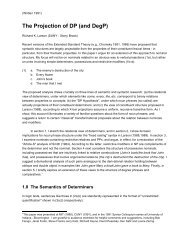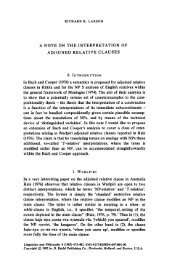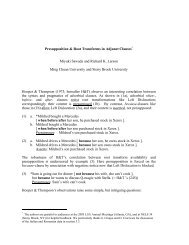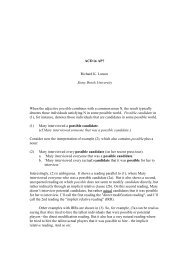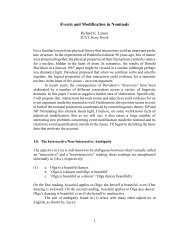Intensional Transitive Verbs and Abstract Clausal Complementation
Intensional Transitive Verbs and Abstract Clausal Complementation
Intensional Transitive Verbs and Abstract Clausal Complementation
Create successful ePaper yourself
Turn your PDF publications into a flip-book with our unique Google optimized e-Paper software.
<strong>Intensional</strong> <strong>Transitive</strong> <strong>Verbs</strong> <strong>and</strong> <strong>Abstract</strong> <strong>Clausal</strong> <strong>Complementation</strong><br />
closely. Ross offers the following paradigms:<br />
{ {<br />
(5) a. I want a cold b. I have a cold<br />
a sister a sister<br />
freedom freedom<br />
a driveway a driveway<br />
#sentencehood #sentencehood<br />
If apparent complements to want (<strong>and</strong> similarly need, expect, require, dem<strong>and</strong>, would-like, seek, hope-for,<br />
beg-for, plead-for, etc.) are actually complements of an inaudible HAVE in a concealed clause, then these<br />
parallelisms are directly explained (6). 4<br />
(6) I want TO HAVE<br />
{<br />
a cold<br />
a sister<br />
freedom<br />
a driveway<br />
#sentencehood<br />
1.2 Binding Effects<br />
Ross (1976) attributes to Perlmutter the observation that certain abstract nouns such as help,<br />
cooperation, sympathy, etc. show disjointness effects following have. When a possessive pronoun<br />
modifying N is coreferential with the subject the sentence is odd (7):<br />
{<br />
(7) a. I had *my cooperation.<br />
b.<br />
your/his/their/Ed’s cooperation.<br />
You have *your sympathy. { my/his/their/Ed’s sympathy.<br />
c. Edi had *hisi help.<br />
{<br />
his j /my/her/their help.<br />
Ross notes this same disjointness effect occurs with want (<strong>and</strong> similarly desire, need, expect, require,<br />
dem<strong>and</strong>, would-like, seek, hope-for, beg-for, plead-for, etc.) substituted for have in (8), but that the effect<br />
is absent with other transitives (9):<br />
{<br />
(8) a. I want *my cooperation.<br />
your/his/their/Ed’s cooperation.<br />
b. *You want your sympathy.<br />
c. Edi wants *hisi help.<br />
{<br />
his j /my/her/their help.<br />
4 This parallel also extends to all so-called "light verb" uses of have. Thus Max had a bath is equivalent to Max<br />
bathed; similarly Max wanted a bath is equivalent to Max wanted to bathe:<br />
(i) a. I want a bath/a nap/a drink/a smoke...<br />
b. I had a bath/a nap/a drink/a smoke...<br />
3



